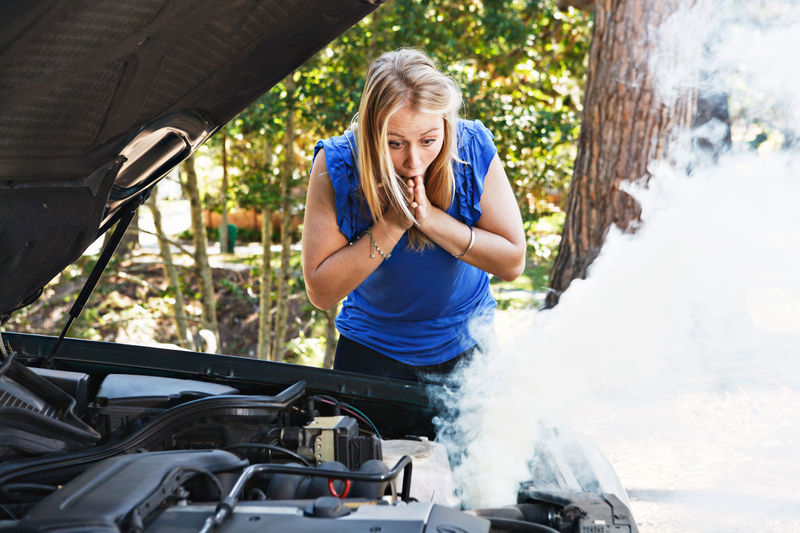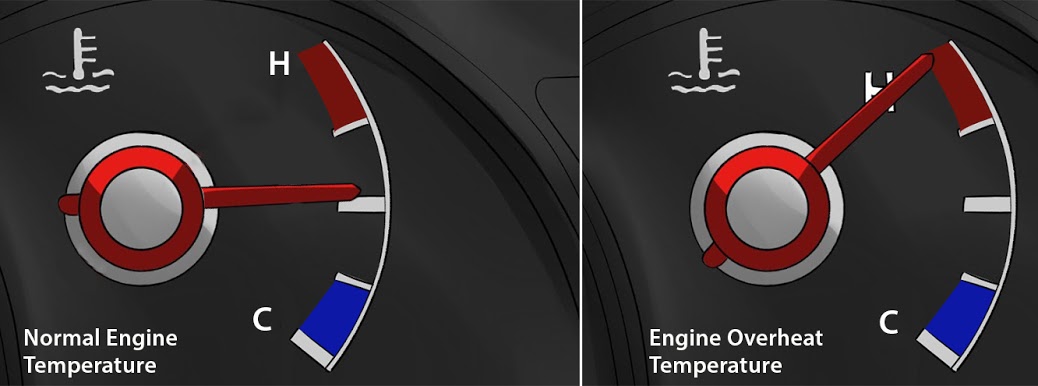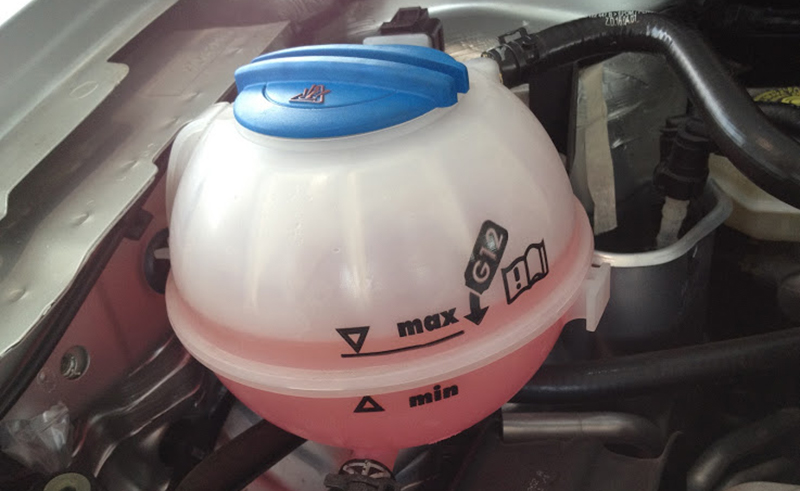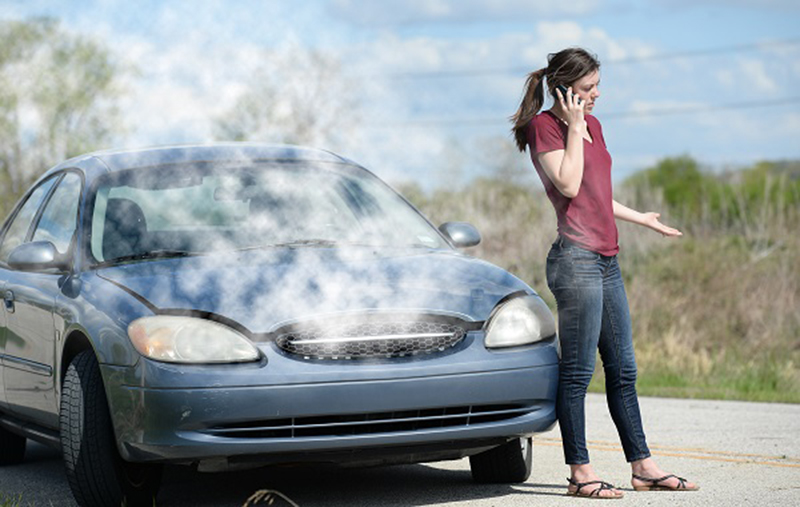Tips to Avoid Car Engine Overheating And How to Fix It: Read Here

An Engine is built to run hot, but up to a certain temperature limit, exceeding the limit can make it prone to engine overheating which can seriously damage the engine components or even destroy the entire engine. All modern cars come equipped with an engine coolant temperature gauge which shows whether your car engine is running at an optimal temperature or not. Whereas an engine overheats faster when the outside temperature is too on a high notch.
The very first question that would come to your mind will be, how to know that your car engine is overheating. It’s quite simple, while driving, the coolant temperature needle should be at the center of the upper (red area) and the lower (blue area) limits (H and C, ‘H’ stands for Hot while ‘C’ denotes Cool). As the needle approaches towards the H point, the engine starts getting hotter, and the continuous driving under this condition results in overheat. And as we earlier told you, an overheated engine can cost you a heavy repair bill !!
So, it’s very important to know that how one can avoid the overheating of the engine, moreover how to cool it down once overheated. In this article, we describe both the aspects of the overheating of an engine.
Let’s start with, How to avoid Engine Overheating:
By taking few precautions while driving or before start driving, you can keep your car engine healthy and help it to run at its optimal temperature.
- Check for engine coolant and add some if necessary –
Coolant helps the engine to run at its optimal temperature. Thereby, coolant should always be between Maximum and Minimum marks for working efficiently. Give a check for it once in a month. To check the coolant level, refer the owner’s manual book of your car to find the identification and the exact location of the coolant reservoir, and add if you found it below the minimum mark. Normally, the Ethylene Glycol (Green Fluid) is used as the engine coolant.
- Check for leak – This can be confirmed by looking underneath the car when the car has stopped and parked. If there is any liquid under the car, get repair the leakage immediately.
- Check entire cooling system – Even after having sufficient coolant in the reservoir, if you are still facing the same overheating problem, give a check to the entire cooling system i.e. electric fan, fan belt radiator, thermostat etc.
- Do not over accelerate the car – An unnecessary acceleration leads to increase the engine temperature. So always drive with appropriate gear engaged.
You can also check-out: What are the Modern Safety Technologies Offered in Cars
What to Do If Your Car Engine Overheats – If the needle of the temperature gauge approaches towards the higher temperature limit or the engine coolant warning light appeared on the instrument cluster, turn OFF the engine with the immediate effect and take the following action to prevent the engine from being damaged:
- Turn OFF the air condition – Shut down the air condition system and open all the windows of the car, as you see the higher engine temperature warning. This will help to release the pressure from the engine and give you a chance to keep alive your car before it dies.
- Turn the car heater ON – I know, this might sound crazy to you, but turning ON the heater allows the engine to cool down by absorbing the heat from it. In summer, if you have to do this don’t forget to roll down the windows.
- Be advised: Always carry some coolant in the car – It is strongly recommended to carry a bottle of coolant in your car. In such situations, coolant works as the life-line for the engine. Though, if don’t have coolant, water will also be helpful. But, before touching any part of the engine, take the following precautions, because in overheating case, the engine compartment temperature is quite high which can strongly harm your body.
Tips and Warnings while dealing with an overheated engine, read here:
- Safety first – Always keep a pair of hand glove in your car, because you don’t know when you have to deal with such situations. Put your hand gloves on and open the bonnet carefully, and let the engine cool itself. But if you see smoke or steam coming out from the engine box, stop the car and come out immediately. In this situation, do not even try to open the hood, ask for help and wait until the car cooled down.
- Never open the radiator cap, until it is not safe to do so – It is not a good idea to open the radiator cap when the engine is warm. As the sudden release of hot pressure from the radiator can seriously burn your body parts. Even after the radiator cooled down, open it carefully. Remember not to lean over the radiator while uncapping it.
- Do not add coolant when the radiator is hot – You are being advised not to add coolant or any cool liquid to the radiator when it is hot. Doing so will crack the engine case that will cost you a large repair bill of which you did not even imagine.
Tips to Avoid Car Engine Overheating And How to Fix It: Read Here
http://www.blog.sagmart.com/wp-content/uploads/2016/09/Car-Engine-Overheating-300x300.jpg All About CarsAutomobiles Car Engine,Engine Coolant Temperature,Engine Overheating
An Engine is built to run hot, but up to a certain temperature limit, exceeding the limit can make it prone to engine overheating which can seriously damage the engine components or even destroy the entire engine. All modern cars come equipped with an engine coolant temperature gauge which shows whether your car engine is running at an optimal temperature or not. Whereas an engine overheats faster when the outside temperature is too on a high notch.
The very first question that would come to your mind will be, how to know that your car engine is overheating. It’s quite simple, while driving, the coolant temperature needle should be at the center of the upper (red area) and the lower (blue area) limits (H and C, ‘H’ stands for Hot while ‘C’ denotes Cool). As the needle approaches towards the H point, the engine starts getting hotter, and the continuous driving under this condition results in overheat. And as we earlier told you, an overheated engine can cost you a heavy repair bill !!
So, it’s very important to know that how one can avoid the overheating of the engine, moreover how to cool it down once overheated. In this article, we describe both the aspects of the overheating of an engine.
Let’s start with, How to avoid Engine Overheating:
By taking few precautions while driving or before start driving, you can keep your car engine healthy and help it to run at its optimal temperature.
- Check for engine coolant and add some if necessary –
Coolant helps the engine to run at its optimal temperature. Thereby, coolant should always be between Maximum and Minimum marks for working efficiently. Give a check for it once in a month. To check the coolant level, refer the owner’s manual book of your car to find the identification and the exact location of the coolant reservoir, and add if you found it below the minimum mark. Normally, the Ethylene Glycol (Green Fluid) is used as the engine coolant.
- Check for leak – This can be confirmed by looking underneath the car when the car has stopped and parked. If there is any liquid under the car, get repair the leakage immediately.
- Check entire cooling system – Even after having sufficient coolant in the reservoir, if you are still facing the same overheating problem, give a check to the entire cooling system i.e. electric fan, fan belt radiator, thermostat etc.
- Do not over accelerate the car – An unnecessary acceleration leads to increase the engine temperature. So always drive with appropriate gear engaged.
You can also check-out: What are the Modern Safety Technologies Offered in Cars
What to Do If Your Car Engine Overheats – If the needle of the temperature gauge approaches towards the higher temperature limit or the engine coolant warning light appeared on the instrument cluster, turn OFF the engine with the immediate effect and take the following action to prevent the engine from being damaged:
- Turn OFF the air condition – Shut down the air condition system and open all the windows of the car, as you see the higher engine temperature warning. This will help to release the pressure from the engine and give you a chance to keep alive your car before it dies.
- Turn the car heater ON – I know, this might sound crazy to you, but turning ON the heater allows the engine to cool down by absorbing the heat from it. In summer, if you have to do this don’t forget to roll down the windows.
- Be advised: Always carry some coolant in the car – It is strongly recommended to carry a bottle of coolant in your car. In such situations, coolant works as the life-line for the engine. Though, if don’t have coolant, water will also be helpful. But, before touching any part of the engine, take the following precautions, because in overheating case, the engine compartment temperature is quite high which can strongly harm your body.
Tips and Warnings while dealing with an overheated engine, read here:
- Safety first – Always keep a pair of hand glove in your car, because you don’t know when you have to deal with such situations. Put your hand gloves on and open the bonnet carefully, and let the engine cool itself. But if you see smoke or steam coming out from the engine box, stop the car and come out immediately. In this situation, do not even try to open the hood, ask for help and wait until the car cooled down.
- Never open the radiator cap, until it is not safe to do so – It is not a good idea to open the radiator cap when the engine is warm. As the sudden release of hot pressure from the radiator can seriously burn your body parts. Even after the radiator cooled down, open it carefully. Remember not to lean over the radiator while uncapping it.
- Do not add coolant when the radiator is hot – You are being advised not to add coolant or any cool liquid to the radiator when it is hot. Doing so will crack the engine case that will cost you a large repair bill of which you did not even imagine.




Leave a Reply